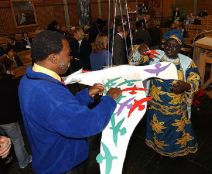Christians That Listen to Marginalized People Can Strengthen Justice, Peace Works: WCC Group

Christians in Churches that listen to the stories of people who are marginalized socially, culturally, economically and politically while recognizing their own discrimination and denial of dignity to others will be in position to strengthen their churches' works of justice that lead to peace, theologians and activists with the World Council of Churches say.
"Churches cannot address these if they do not see and are not immersed in the experiences of suffering as well as overcoming the same," the working group of the WCC's program on Just and Inclusive Communities said on Thursday. Among the marginalized are victims of violence, racism, and casteism, and "all those who are discriminated, violated, disempowered and excluded."
The working group issued the statement in a set of reflections on the theme of ecumenical organization's 10th Assembly in October in Busan, South Korea next October. The theme of the gathering, which is expected to bring together representatives from the fellowship's 349 member churches, is "God of Life, Lead Us to Justice and Peace."
"[O[ur affirmation of hope in the God of Life must not be at the cost of ignoring or mocking the 'nightmarish' realities of people and communities whose lives are constantly threatened, abused and destroyed," they wrote.
The working group wrote that the theme is a call to strengthen work in the areas of justice and peace, inspiring creative and courageous initiatives. God's peace is neither passive nor placid but one that kindles and sustains hope and life through justice and love, they said.
"Excessive emphasis on prayer alone may be perceived as abdicating engagement and instead may encourage or justify inaction and complicity in injustice," the group wrote.
The group issued a list of people who are on the receiving end of injustices, including: "victims of cultures and systems of discrimination and violence, such as racism, casteism, injustices affecting indigenous peoples, people with disabilities, people who are displaced and forced to migrate, ethnic, linguistic, religious and sexual minorities, and all those who are discriminated, violated, disempowered and excluded."
"It is, therefore, necessary to create spaces for the narratives of these voices, so that the churches' reflections on life, justice and peace may enable the promise of abundant life that Jesus announced for all, in particular for those made and kept as last and the least, for whom Jesus said the coming Reign of God belongs," the group wrote.
The group also said the churches should recognize injustice's "entrenched presence within," saying churches should recognize their own discrimination and denial of dignity.
Those practices "often receive tacit legitimization in the name of culture and tradition," they wrote.
The group refers to Micah 6:8, which states:
"He has told you, O mortal, what is good;
and what does the Lord require of you
but to do justice, and to love kindness,
and to walk humbly with your God?" (NRSV)
"The biblical message reminds us of the need to DO justice, since it is not an object to be obtained, a destination to be reached or an intellectual ideology to be imagined, but a reality achieved through radical concrete action. Therefore, churches must ask God to lead us or strengthen us to struggle for justice," the group adds.
The group emphasized the need of hearing from people who were marginalized, saying those voices "need to inform any reflection on the theme that claims to be authentic or pragmatic."
----
On the Web:
Reflections on WCC 10th Assembly theme "God of Lilfe, Lead us to Justice and Peace"
